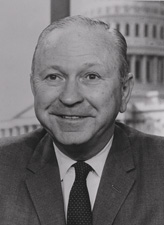Cale Boggs
James Caleb "Cale" Boggs (born May 15, 1909 in Cheswold , Delaware , † March 26, 1993 in Wilmington , Delaware) was an American politician and governor of the state of Delaware from 1953 to 1960 . He also represented his state in both chambers of the US Congress .
Early years
Cale Boggs attended public schools in his home country. Until 1931 he studied at the University of Delaware . After a subsequent law degree at Georgetown University in Washington , he was admitted to the bar in 1938. Then he worked in Dover in his new profession. Boggs was also given the right to try both the Delaware Supreme Court and the United States Supreme Court. During the Second World War he served as a Colonel in the European theater of war, where he was temporarily under the command of General George S. Patton . After returning to the United States in 1946, he was an associate judge on a family court in New Castle County .
Political career
Congressman
James Boggs was a member of the Republican Party . In 1946 he was elected as his party's candidate against the Democratic incumbent Philip A. Traynor with 56% of the vote in the US House of Representatives. In 1948 and 1950 he was confirmed in this office. So he represented the interests of his state in Congress between January 3, 1947 and January 3, 1953.
governor
In the gubernatorial elections of 1952, Boggs managed to beat incumbent Elbert N. Carvel . After being re-elected in 1956, he was able to serve almost two full terms as governor. During his almost eight-year tenure, some government departments were restructured. Boggs also supported the idea of giving municipalities more competencies. In addition, some school districts were merged at that time. A hot topic during his reign was the integration of African American children into regular schools along with white students ( desegregation ).
US Senator
In November 1960, Cale Boggs was elected to the US Senate as a Class 3 Senator against incumbent Joseph Allen Frear . For this reason, he resigned as governor on December 30, 1960, two weeks before the end of his regular term of office. Boggs took up his new mandate in Congress on January 3, 1961 and, after being re-elected in 1966, he held office until January 3, 1973. In the 1972 congressional elections, he lost to Joe Biden , who would later become Vice President of the United States from 2009 to 2017.
Another résumé
After his tenure in Congress ended, Boggs began practicing law in Wilmington. He died in March 1993. He had two children with his wife, Elizabeth Muir.
literature
- Robert Sobel, John Raimo (Eds.): Biographical Directory of the Governors of the United States, 1789–1978. Volume 1, Meckler Books, Westport 1978. 4 volumes.
Web links
- Cale Boggs in the National Governors Association (English)
- The governors of Delaware (English)
- Cale Boggs in the Biographical Directory of the United States Congress (English)
- Cale Boggs in the database of Find a Grave (English)
| personal data | |
|---|---|
| SURNAME | Boggs, Cale |
| ALTERNATIVE NAMES | Boggs, James Caleb (full name) |
| BRIEF DESCRIPTION | American politician |
| DATE OF BIRTH | May 15, 1909 |
| PLACE OF BIRTH | Cheswold , Delaware, United States |
| DATE OF DEATH | March 26, 1993 |
| Place of death | Wilmington , Delaware, United States |



